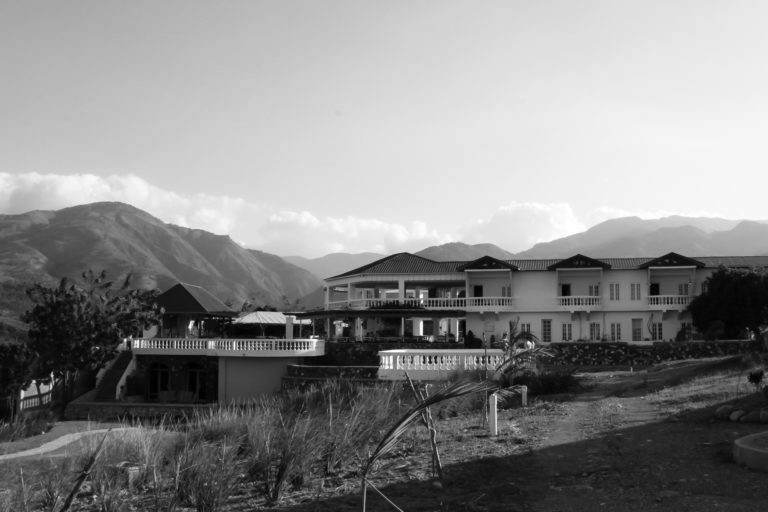by Robin Gericke, Executive Editor
Hiking to waterfalls, staying at a resort, visiting white sand beaches – that doesn’t seem like a mission trip to Haiti. Yet that is how trip leader and Asbury University professor Dr. Jim Shores and 14 communication students spent their spring break. The group partnered with the Hands and Feet Project (HAF) to create a PR package for Ikondo, HAF’s new job creation project that provided the group with the fun opportunities more typical of a vacation.
Founded in 2004 by the Grammy award-winning band Audio Adrenaline, HAF broke ground on their first Children’s Village with the goal of providing family-style, residential care for children in crisis. Now, HAF runs three Children’s Villages across Haiti. The band’s popular song ‘Big House’ was inspired by the Children’s Village in Jacmel, and a sign that reads ‘BIG HOUSE’ is hung over the door.
However, the goal of HAF is not simply orphan care but keeping families together. More recently, HAF started Ikondo as a way to meet that goal. Called a guest mission house, Ikondo is a white-walled, red-roofed resort built by a Haitian construction crew in Grand Goave, Haiti. Guests can behold views of the mountains and the ocean from the turquoise rocking chairs that line the balconies. The purpose of Ikondo is job creation, and HAF provides employment for over 200 Haitians. By having stable jobs, these employees can now afford to support their families and take care of their children, according to Mark Stuart, former Audio Adrenaline band member.
Stuart co-founded HAF and serves as its director. He understands that visiting Ikondo doesn’t seem like a typical visit to Haiti, yet it’s doing more long-term good than a short-term mission trip. “We ought to be able to serve and to give sacrificially without taking away the economy,” Stuart said.
The Central Intelligence Agency reports that Haiti is the poorest country in the Western Hemisphere, and 60 percent of the population live under the national poverty line. While the country’s GDP growth rose 5.5 percent in 2011 as the economy began recovering from the devastation of the 2010 earthquake, it slowed to below 2 percent in 2015 and 2016. Political uncertainty, drought conditions, decreasing foreign aid and depreciation of the national currency prohibited investment and economic growth.
“Because it’s so close to America, it’s so broken, it’s so needy that we’ve almost become addicted to coming here to help,” Stuart said. “We come here to help and it creates cyclical dependency.”
Stuart believes that Ikondo is how HAF will do the right thing instead of just doing something to serve Haiti. Yet pitching this type of trip to teams is a challenge as it doesn’t provide the typical ‘feel good’ opportunities. “The reality is that, yeah, you can serve people in Haiti, and you can sweat and sacrifice. But believe me, I’ve been coming here for decades. It doesn’t move the needle,” Stuart said. “For you to come here and feel good about yourself for one week is a great emotional hit, but Haiti’s economy is who’s writing the check for that. So how can you come here and serve in a way that doesn’t create a bigger problem?”
Ikondo team director Kenny Jones told teams about a bridge that washed out in a neighboring village during Hurricane Matthew in 2016. In the aftermath, a foreign organization came in to construct a new bridge. Despite the villagers’ requests to not replace the bridge, the organization built a concrete bridge. But because it was not constructed with holes in the sides, the next heavy rainfall washed it away and it backed up the water. This caused the village to flood, and 30 people died. Jones reminded teams of the long-term costs of short-term missions when foreigners think they know better than the residents of the country.
Completely constructed by Haitians, Ikondo stands as an example of their skill and expertise, and Stuart reminds mission teams of that. “The reality is we don’t need you to come here to build houses. First of all, you don’t even know how to build a house. Second, if we really needed houses, just make a donation and we’ll hire Haitians to do it. You would get in the way,” he said. Instead of doing construction work, teams at Ikondo experience Haiti’s beauty and culture through hiking to waterfalls, visiting beaches, snorkeling, visiting the Children’s Villages, going to the market and more.
Junior Meredith Brumfield experienced this shift in her expectations of the trip to Ikondo. “I came here expecting to change Haiti, but this week, experiencing the beauty of Haiti in the culture, the people and the country itself has wholly changed me and my perspective of Haiti,” she said.
Shores saw the value in Haitian culture through his experience at Ikondo. “What I think was great about this trip was the opportunity to see Haitian people in their own culture and to really understand that culture much better than what you hear on the news. I think it was beneficial for students to see what they brought to the culture, but more what the Haitian culture brought to them,” said Shores.
With hopes to host book conferences and numerous college teams at their facilities, Stuart’s goal is to rewrite the narrative of Haiti through Ikondo. He hopes that Haiti will become a destination for travel, instead of just mission work.
“Today we’re going to start a new narrative for this country, and a part of that is you being more intentional about your visit, and also how you communicate when you get back home,” Stuart said. “Yeah, Haiti is busted, it’s broken up, saw a lot of poverty. However, beautiful waterfalls, beautiful beaches, amazing mountains. And the people – the people are fantastic. So that’s our goal – to help the economy through tourism and help families thrive through having jobs.”
Photo via COM397




